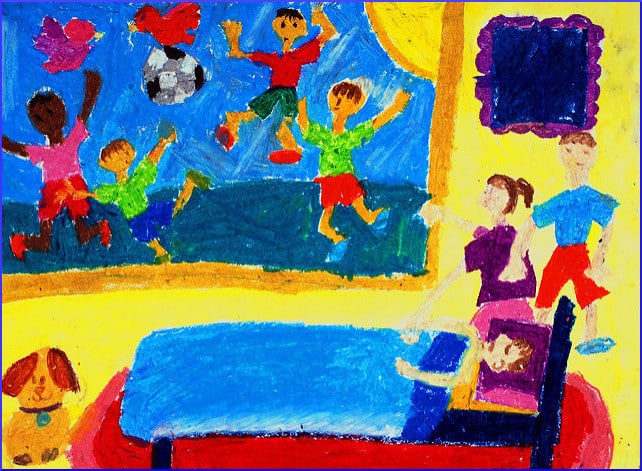
The psychological underpinnings of addiction to alcohol, hard drugs, or overeating often involve more than one person. The dynamic is different according to the age of the patient. A child, of course, has no choice but to cooperate in whatever type of relationship the ruling adult sets up. When a person grows older, it becomes more complicated because their own psychological quirks help define and shape the codependency relationship.
Author and relationship expert Sarah Jones makes a case for the idea that “codependency” has become a label of shame that serves no good purpose. She says, “The term has become so misconstrued that many clinical psychologists don’t even use it any more.”
Jones points to the venerable Merriam-Webster Dictionary, where codependency is defined as being “controlled or manipulated by another who is affected with a pathological condition,” or “dependence on the needs of or control by another.” Codependency is generally considered to be undesirable, a disorder.
The term came to be used extensively in the world of 12-step programs. It was observed that an alcoholic might have a spouse or other person who seemed to need the chaos, trauma and pain caused by that alcoholic. The codependent person feels compelled to play the martyr role, or to assuage guilt from the past, or even just to be convinced that her or his life matters and makes a difference to someone. When a misconception like this takes hold, it can lead the codependent person into actually becoming an enabler of the alcoholic’s addiction.
The misty past
Psychotherapist and codependency expert Ross Rosenberg tells us that in the early days, logically enough, “co-alcoholic” was the word for the partner or helper who was enmeshed with the alcoholic’s disease. Then, in the 1980s, when illicit drug use became widespread, treatment programs spoke of “chemical dependency” and alcoholism was seen as a sub-category of chemical dependency.
But that was too many syllables, so people in the field shortened it to “co-dependency” and that’s when things started to go haywire. Currently, says Rosenberg,
Codependency is a problematic relationship orientation that involves the relinquishing of power and control to individuals who are either addicted or who are pathologically narcissistic. Codependents are habitually attracted to people who neither seem interested nor motivated to participate in mutual or reciprocal relationships… As much as they resent and complain about the inequity in their relationships, codependents feel powerless to change them.
This is why friends and relatives attend Al-Anon meetings, to figure out how to have a relationship with the addict that doesn’t drag them down too. Dr. Shawn M. Burn, Professor of Psychology at California Polytechnic State University, agrees that both the meaning and the usefulness of the codependency concept have been diluted by overuse, and by the media playing fast and loose with the word, reshaping it to suit their momentary need.
To Burn, it signifies a particular type of dysfunctional helping relationship. In her article for Psychology Today, Dr. Burn writes,
Broadly speaking, in dysfunctional helping relationships, one person’s help supports (enables) the other’s underachievement, irresponsibility, immaturity, addiction, procrastination, or poor mental or physical health… Codependent relationships are close relationships where much of the love and intimacy […] is experienced in the context of one person’s distress and the other’s rescuing or enabling.
Helpers “often find intimacy in relationships where their primary role is that of rescuer, supporter, and confidante. These helpers are often dependent on the other’s poor functioning to satisfy emotional needs…” On some level, both participants feel like winners in this devil’s bargain, when actually the game is rigged so that they both lose.
A complicated example
The confusion really piles up when contemplating, for instance, the thankfully rare condition known as “Munchausen syndrome by proxy,” where a caregiver (almost always female) actively causes illness in the patient. One could speculate about the relationship between this bizarre disorder and the traditional societal expectations laid upon women.
Especially in cultures where other options are limited, women reap huge amounts of respect and esteem for taking care of the sick. Is it any wonder that, sometimes, they help the process along by causing the sickness? In which case, the caregiver is the one with a serious and potentially murderous mental problem.
But let’s return to what the dictionary says about codependency — “controlled or manipulated by another who is affected with a pathological condition,” or “dependence on the needs of or control by another.” The sick child is controlled, manipulated, and totally dependent on the Munchausen mom — which would then define the child as the mentally ill member of the duo.
Flipping the script
But that doesn’t make sense. A 4-year-old who is being surreptitiously poisoned by her caregiver is not the mentally ill one! That little bundle of neediness is absolutely dependent and controlled — but what 4-year-old isn’t, especially when fighting for life in a hospital bed? Technically, according to the definition, that sick kid is codependent as hell. But to apply the label to the child would be grotesque.
The Munchausen mom, the person who is doing the controlling and the manipulating to get her own needs met, is in truth the mentally disturbed one, the one with an off-the-charts case of codependency. And that is the problem. When the same word is used for the long-suffering wife of a heroin addict, who tries to do everything right to keep the family intact, those two usages are so different that the term is meaningless.
Your responses and feedback are welcome!
Source: “The Myth of Codependency,” GoodMenProject.com,12/04/14
Source: “The History of the Term, ‘Codependency’,” PsychCentral.com
Source: “Are You In a Codependent Relationship?,” PsychologyToday.com, 07/14/13
Photo credit: Korean Resource Center on Visualhunt/CC BY-SA

 FAQs and Media Requests:
FAQs and Media Requests: 











